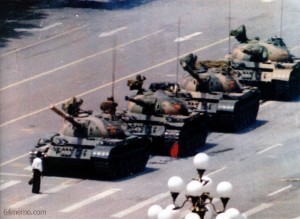It was 20 years ago today (thanks, John & Paul…) that China sent its military into Tienanmen Square to put down a student-led uprising devoted to inculcating Western democratic values into the PRC. The photos of that young man standing in front of a row of tanks will never lose their place among the most famous images in history.
But imagine if the Tienanmen protests had been coupled with the power of the Internet, especially social media. Just as news is dispersed even quicker on Twitter than Web-powered news sites — which themselves compress the news cycle to hours from days — the immediacy of social media provide a fertile ground for mass gatherings and other grassroots organizing efforts. In the U.S., we can see this with Tweetsgiving and the like, plus MoveOn and other progressive political activists. In the authoritarian parts of our world, however, it is the opposite.
The answer to the imaginary question is that if Twitter and other social media networks had been available in China, Shanghai might already be free, more than economically. One can see this clearly from the reaction of the Chinese party to social media in its preparations to bury anniversary celebrations of the Tienanmen massacre. China Blocks Twitter, Flickr, Bing, YouTube and Hotmail Ahead of Tiananmen Anniversary [guardian.co.uk]. It is hardly different from Iran, for example, which banned Facebook for nearly ten days leading up to its recent elections, or Cuba and other repressive regimes blocking Internet technology and sites in order to control propaganda. But the significance is overwhelmingly real. ”Information wants to be free,” the old watchword of hacking and digital freedom proponents, is alive and well in this Web 2.0 era. Just check out the trending Twitter topic #ChinaBlocksTwitter to see for yourself.

